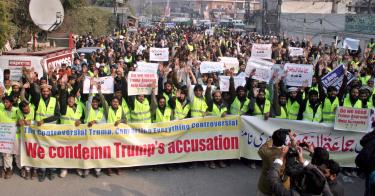It’s not just “complicated,” it’s deeply dysfunctional. And expensive. Over the last 15 years, America’s “partnership” with Pakistan has cost U.S. taxpayers over $33 billion.
Last week, the Trump administration signaled American largesse was coming to an end. Pakistan has “given us nothing but lies and deceit [and] safe haven to the terrorists we hunt in Afghanistan,” President Trump tweeted before announcing the U.S. would freeze up to $1 billion in aid to Islamabad.
The president’s frustration was palpable — and justified. For more than a decade, Islamabad has undermined the U.S.-led effort to bring peace and stability to Afghanistan, offering support and shelter to the Taliban and allied militant groups. It’s made a distinction between “bad militants” attacking Pakistan and “good militants” targeting India, Afghanistan, and any U.S. troops caught in the crossfire.
To persuade Pakistan to abandon this “double game,” Washington tried showering Pakistan with lucrative diplomatic and economic enticements. Predictably, the all-carrot, no-stick approach failed each time. It’s proven exceedingly difficult to change a country’s cost-benefit calculus when you’re unwilling to impose any costs.
Ultimately, the objectives of the U.S. and Pakistan in Afghanistan are fundamentally incongruent. Above all, Islamabad wants a government in Kabul that is pliable, submissive, and hostile to India. Since the Afghan people, now understandably hostile to Pakistan and favorable toward India, will never elect such a government, Islamabadprefers an Afghan government that’s weak and divided.
Not only has their quest for instability in Afghanistan been wildly successful, they’ve persuaded the U.S. to foot much of the bill.
U.S. lawmakers began to tire of this “double game” years ago.
“The Pakistan Army knows exactly where these [militant] networks and their families are,” Sen. Bob Corker, Tennessee Republican, declared in 2016. “Extreme duplicity exists with this relationship.”
This frustration has been reflected in a steady decline of American aid. The request for appropriations and military reimbursements to Pakistan fell from $2.6 billion in 2013, to $1.6 billion in 2015, to just $350 million for FY 2018.
Now this resentment has reached the executive branch as well. Longtime defenders of the status quo in the State and Defense departments are, for the first time, finding themselves incapable of “holding the line.”
Pakistan can’t say it wasn’t warned. Last August, President Trump declared: “We can no longer be silent about Pakistan’s safe havens for terrorist organizations That will have to change, and that will change immediately.”
Similarly, the administration’s National Security Strategy, released in December, insisted that “no partnership can survive a country’s support for militants and terrorists who target a partner’s own service members and officials.” On the ground, the Trump administration authorized an increase in U.S. drone strikes against militants operating along Pakistan’s western border.
At least one influential Pakistani politician seems to be taking the Trump administration seriously. On Jan. 3, Nawaz Sharif, who resigned as prime minister last July, implored Pakistanis to “appraise our actions” and “break this spell of self-deception.” It was time, he said, to put Pakistan’s “house in order” and “reflect on why the world holds negative opinions about us.”
Unfortunately, Pakistan’s all-powerful military remains intransigent and in denial. When U.S. Ambassador to the United Nations Nikki Haley accused Pakistan of “harbor[ing] the terrorists that attack our troops in Afghanistan,” a Pakistani military spokesman noted Ms. Haley’s Indian ancestry and said that the “current misunderstanding between Pakistan and the U.S. is created by India.”
That kind of cynical deflection won’t cut it anymore. The status quo, long viewed by Washington as lamentable but tolerable, will no longer be a costless affair for Pakistan. Whether Mr. Trump’s new approach leads to a more productive relationship or to a vicious cycle of recrimination and rancor will depend entirely on Islamabad’s next move.
The path to stability, prosperity, and a true strategic partnership with America is clear: Abandon your support for Islamist extremists; end your paranoid hostility toward with India; make peace with your Afghan neighbors, and respect freedom and religious liberty at home.
This piece originally appeared in The Washington Times




